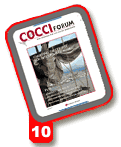COCCI ViewsIt’s all about food safety - Stephen P. Collins Vice President, Worldwide Poultry Schering-Plough Animal Health Corporation
When looking over the articles
for this issue of CocciForum, I
was moved by Dr. Corrado
Longoni’s main reason for wanting
to remove drugs from the
poultry feeds used by his
employer, Martini Alimentare, a
major producer in Italy. More drug bans comingLater that same day, I reviewed a paper that my colleague, Dr. Fabio Paganini, prepared for the Seventeenth European Symposium on the Quality of Poultry Meat in the Netherlands this May. He noted the growing concerns from consumers and the medical community about antibiotic resistance in animals being passed along to humans. Even though this relationship has been a controversial issue, the use in animal feed in the European Union will be prohibited as of January 1, 2006. How long will it be before the US and other major markets do the same — if only to meet demands of export markets? Then there are the ionophores, another type of feed
antibiotic commonly used in poultry and livestock to manage
coccidiosis. Paganini writes that the use of these in-feed
anticoccidials in livestock does not appear to be related to
the development of resistance in humans. There are alternativesSchering-Plough Animal Health saw this trend coming in
the 1990s and recognized the need for alternatives to
coccidiosis management. That certainly gave us reason to
speed development of our two lines of coccidiosis vaccines,
Coccivac and Paracox, but we also saw an opportunity
to help the poultry industry find drug-free alternatives
without compromising performance, efficiency and
profitability. More importantly, we are grateful for the many independent experts who have been working closely with us to develop the IDEA concept for better intestinal health. You can count on us to bring you more ideas and products for better intestinal health in the future. |





 © 2000 - 2021. Global Ag MediaNinguna parte de este sitio puede ser reproducida sin previa autorización.
© 2000 - 2021. Global Ag MediaNinguna parte de este sitio puede ser reproducida sin previa autorización.